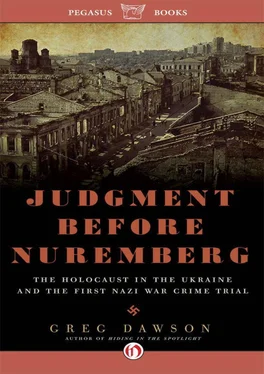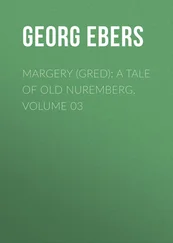The interviews were conducted at the dining table in my mother’s condominium in northeast Atlanta using a Radio Shack cassette recorder with a plastic microphone stand. Having spent much of her life as a concert pianist, my mother was no stranger to microphones and performing on cue—to rehearsal and repetition until it was perfect. She was used to commanding the stage. At seventy-three, her memory and focus remained extraordinary. Only once in ten hours of questions and answers over two days did she succumb to emotion and stop momentarily to gather herself—when she spoke of her mother, “my greatest hero,” crisscrossing Nazi-occupied Kharkov on foot in a futile search for a Russian Orthodox priest to baptize her daughters, to de-Jewdify them.
Back home in Indiana, I found an executive secretary in a bank who transcribed tape recordings on the side and was pleased to receive such a large order, though she warned me she knew little about the Holocaust. A few weeks later she returned a fine transcript with a personal note. “I loved listening to your mother tell her story. It is truly amazing. She sounds like a truly incredible person.”
These unsolicited comments by a stranger were the first objective confirmation of my purely subjective view that an amazing story had fallen in my lap—or perhaps, more to the point, I had fallen in the story’s lap at Bloomington Hospital in December 1949. Leafing through the transcript, I had the same thought I had that day in 1978 in The Herald-Telephone newsroom, typing in disbelief as my mother related her story to me for the first time over the phone: “This is incredible copy.”
In fact, it was so incredible, so rich, I panicked. It was like finding a bag on your doorstep with a million dollars in unmarked bills. Now what? I didn’t want to do anything impulsive—I needed a plan. I put the transcript in a drawer for safekeeping and deep thought. Meanwhile, I returned to Atlanta for a followup interview, which produced another transcript for the drawer. About that time I received a note from Frina that left me perplexed. Politely, without explanation, she declined my request to be interviewed for the book.
The doorstep bounty was still in the drawer, untouched, when in 2003 we did the unthinkable—for the sixth time—uprooted. This time it was back to Orlando where, ironically, Tim Franklin had succeeded the Sentinel editor who caused me to flee to Indiana to work for Franklin at The Star. The transcripts went from the drawer to a moving box marked “den.” In Orlando we bought a house with an upstairs room with a view conducive to writing an overdue book. On my first official day as an “author,” the silence from upstairs was so deafening that after a few hours Candy looked in to see if I had fallen asleep at the keyboard. She found me staring at a stubbornly blank screen.
As I struggled to give narrative form to the material, to transfer the music of my mother’s words to the page, Candy repeated something she had said from the outset.
“You need to go to Ukraine.”
“No, I don’t,” I repeated.
There was nothing to be gained by going to Ukraine, I argued. Nothing to see there that I couldn’t see in pictures, no one left to talk to who knew my mother. I didn’t speak the language. It would be a long, expensive trip for nothing. I had the whole story right here in my mother’s words.
I was right—I had the story. And a year later, after writing in the mornings before work and on weekends, I had a manuscript. What I didn’t have, it turned out, was a book. Pleased to be “finished” and eager for feedback, I gave the 35,000-word manuscript to a Sentinel colleague, Jean Patteson, a constant reader and wonderful writer. She read it over the weekend and flagged me down on Monday morning.
“This is the most amazing story I’ve ever read,” Jean said.
My heart leapt. Then Jean dropped the hammer.
“But it’s not a book. What you have is a great outline for a book.”
The manuscript lacked emotion and sense of place, Jean said. The story felt distant, reportorial. The solution was obvious.
Candy was right. I had to go to Ukraine.
In September 2006, Candy and I traveled from Orlando to Kiev, the capital of Ukraine and unofficial line of demarcation between the west, where Ukrainian is the dominant language, and the east, where anything other than Russian raises bushy eyebrows. After two days in Kiev we hopped an eastbound train for Kharkov, where my mother had studied at the music conservatory. Later, we would travel south to her hometown of Berdyansk on the Sea of Azov where she had played her first public performance on the radio at age six.
To supplement my thirty words of Russian, which could be stitched together for basic greetings and questions, we were armed with a handwritten message of introduction, in Russian, from my mother, which we had printed on the back of cards to hand out to locals baffled by my pidgin Russian.
“Dear Countrymen!” she wrote, “I am turning to you because my son Greg and his wife Candy don’t speak the language and need your help. He wrote a book about Ukraine and my family. My name is Zhanna Arshanskaya (married name Dawson). I was born in Berdyansk in 1927. Our family moved to Kharkov in 1935 and we were there when the Germans invaded. Everyone in my family was killed and it is only because of the help of the kind population in our wonderful country that my sister and I are still alive so the story of our life in Ukraine can be told. Greg’s book is about the heroism of our people. He and Candy know a lot about Ukraine and fell in love with the country and decided to fly to you even though they don’t know the language. Trust them 100%—they already love you the way their mother does. Thank you all for your generosity and colossal courage. Be happy and healthy. Zhanna Arshanskaya Dawson, who would love to be going to see you.”
My mother could have been there. We invited her to come along, and she was in robust health, a daily walker with hand weights up and down the hills of her neighborhood in the Buckhead section of Atlanta. She declined, reminding us that she hated to travel. True. She had not left the country since arriving in 1946. It was hard enough getting my mother on a plane to Florida or Indiana, much less Ukraine. I ascribed her general aversion to travel to the fact she’d simply had her fill of it during the war. Yet, I wondered if turning down the opportunity to visit her homeland with us was rooted in something deeper than the hassle of going through security.
As stolid and unflinching as my mother had been through all our interviews, and despite her growing willingness to speak about her own experience, the fact was she had never read a book or seen a film about the Holocaust, even the less graphic and emotionally wrenching ones I recommended, such as Schindler’s List and Life Is Beautiful. I had the feeling she declined our invitation to Ukraine for the same unspoken reason.
As it turned out, her instincts probably served her well. The last time she had seen Kharkov, in December 1941, the city was in semi-ruins, occupied by Nazis. Returning to her former home and seeing the house down the street where she had been hidden for two weeks by a non-Jewish family would have been a mixed emotional moment, as would visiting the secondary school she attended and the music conservatory in the center of the city where she and her sister studied.
But around so many other corners lurked images freighted with nightmares for my mother, like the majestic statue of the Ukrainian poet Shevchenko which she saw festooned with Jewish corpses. The most terrible possibility is that she would have accompanied us to the memorial at Drobitsky Yar outside the city where her parents and grandparents were murdered—and where she and Frina were supposed to die, too—along with sixteen thousand other Jews.
Читать дальше












